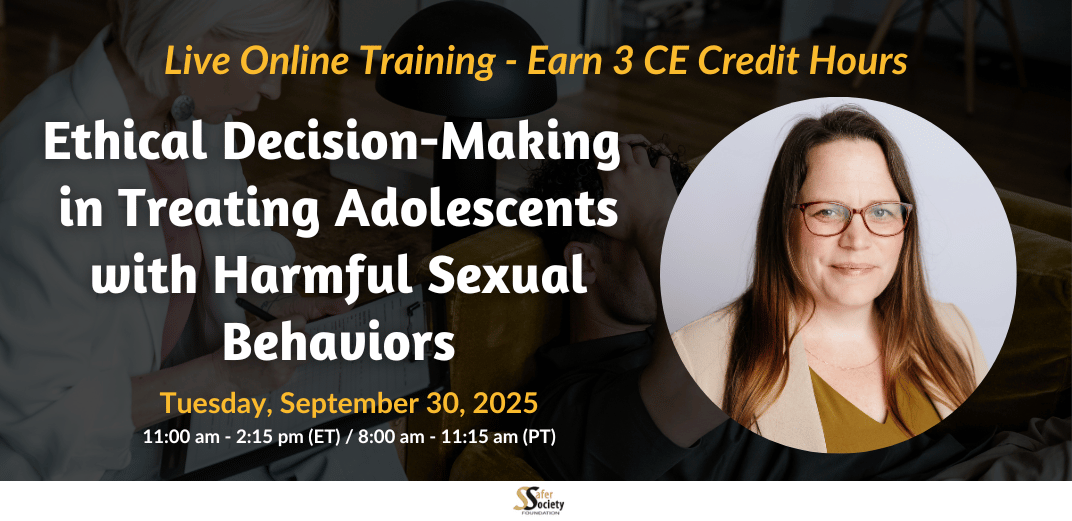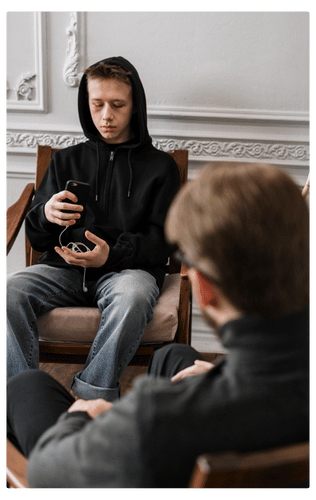
Ethical Decision-Making in Treating Adolescents with Harmful Sexual Behaviors
 Working with adolescents who demonstrate problematic or harmful sexual behaviors frequently presents complex ethical challenges. Practitioners often face difficult decisions regarding who is entitled to receive specific information and under what circumstances. Issues related to professional boundaries can quickly escalate, often requiring immediate and informed judgment. Navigating these situations requires a strong ethical framework and clear guidance.
Working with adolescents who demonstrate problematic or harmful sexual behaviors frequently presents complex ethical challenges. Practitioners often face difficult decisions regarding who is entitled to receive specific information and under what circumstances. Issues related to professional boundaries can quickly escalate, often requiring immediate and informed judgment. Navigating these situations requires a strong ethical framework and clear guidance.
In this training, Ms. Pryor explores the ethical tensions that arise between treatment providers and the criminal justice system—each with their own goals and approaches. She discusses strategies for aligning therapeutic interventions with both legal requirements and ethical standards, and reviews relevant ethical codes to support effective and principled clinical decision-making.
Ms. Pryor also offers practical guidance for managing the balance between client confidentiality and community safety, especially when concerns for public welfare emerge. Additionally, she examines challenges related to informed consent and client autonomy, particularly in the context of court-mandated treatment or when working with adolescents who minimize or deny the impact of their behavior. Strategies for maintaining professional boundaries and avoiding dual relationships or conflicts of interest are covered, with a focus on protecting therapeutic integrity. Ms. Pryor also explores disclosure dilemmas, including how clinicians can determine what and when to share sensitive information in ethically complex situations.
Interactive Follow-Up Meeting
Attendees are invited to join an open discussion 15 minutes following the end of the training, where you can engage with fellow attendees by turning on your camera and microphone. This is an opportunity to share your experiences and contribute to a meaningful exchange of ideas. Time will be allocated to address questions or insights from the training. Please note that attendance is optional and will not affect your eligibility for a training certificate.
1) Analyze ethical dilemmas involving confidentiality and public safety.
2) Evaluate approaches for sustaining informed consent and professional boundaries in court-mandated or challenging clinical circumstances.
3) Describe how the different goals of treatment programs and the legal system can create ethical dilemmas.
4) Apply an ethical decision-making framework to navigate clinical situations, including those involving disclosure, dual relationships, and treatment within the type of system that limits client autonomy.
Audience
This training is primarily for clinical practitioners, therapists, counselors, and other professionals working with adolescents exhibiting problematic sexual behaviors. This includes psychologists, social workers, counselors, probation officers, case managers, social service providers managing risk in community settings, and treatment providers involved in court-mandated or forensic settings.
Content Level
Disclosure
Cancellations
Continuing Education Approval
American Psychological Association (APA)
Safer Society Foundation, Inc. is approved by the American Psychological Association (APA) to sponsor continuing education for psychologists. Safer Society Foundation, Inc. maintains responsibility for this program and its content.
Association of Social Work Boards (ASWB)
Safer Society Foundation, Inc., provider #233, is approved to offer social work continuing education by the Association of Social Work Boards (ASWB) Approved Continuing Education (ACE) program. Regulatory boards are the final authority on courses accepted for continuing education credit. ACE provider approval period: 06/06/2025—06/06/2026. Social workers completing this course receive 3 ethics continuing education credits.
Who's Presenting

Amanda L. Pryor, MSW, LCSW, CSAYC, ATSA-F
Amanda Pryor, MSW, LCSW, CSAYC is a Licensed Clinical Social Worker with over eighteen years of experience. She is a graduate of Indiana University School of Social Work. Her specialty is working with adolescents who have engaged in sexually harmful behavior. She is the Director and is credentialed with IN-AJSOP, Indiana’s Initiative to Advance the Treatment of Sexually Maladaptive Youth. Currently, as the director of IN-AJSOP she provides credentialing services for professionals in field of sexual maladaptive behaviors. Amanda is also the Juvenile Representative on the ATSA Board.
